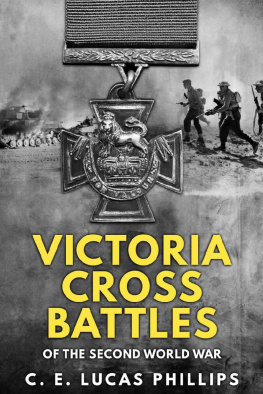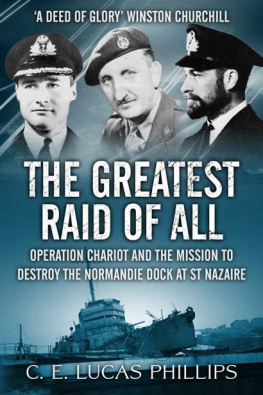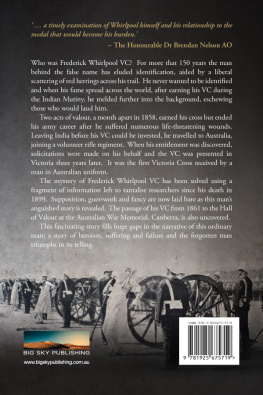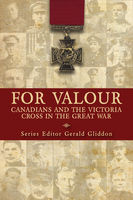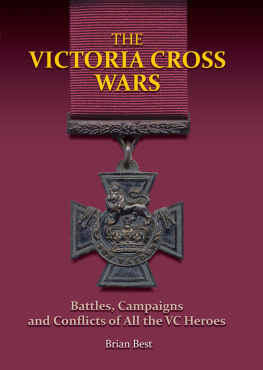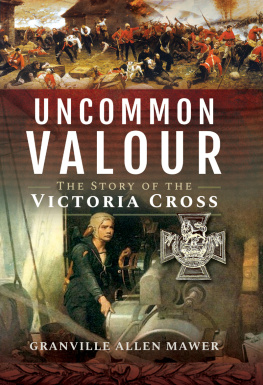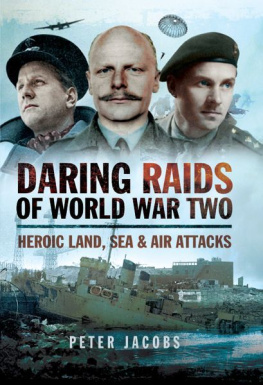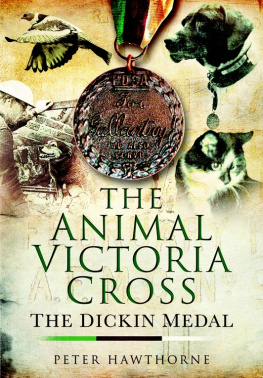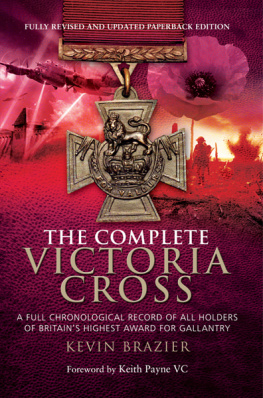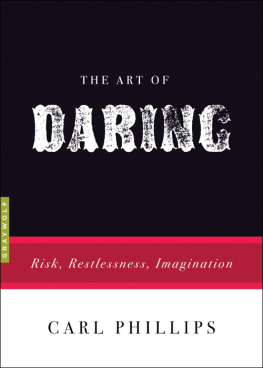C. E. Lucas Phillips - Victoria Cross Battles of the Second World War (Daring Military Operations of World War Two)
Here you can read online C. E. Lucas Phillips - Victoria Cross Battles of the Second World War (Daring Military Operations of World War Two) full text of the book (entire story) in english for free. Download pdf and epub, get meaning, cover and reviews about this ebook. year: 2021, publisher: Sapere Books, genre: Non-fiction. Description of the work, (preface) as well as reviews are available. Best literature library LitArk.com created for fans of good reading and offers a wide selection of genres:
Romance novel
Science fiction
Adventure
Detective
Science
History
Home and family
Prose
Art
Politics
Computer
Non-fiction
Religion
Business
Children
Humor
Choose a favorite category and find really read worthwhile books. Enjoy immersion in the world of imagination, feel the emotions of the characters or learn something new for yourself, make an fascinating discovery.
- Book:Victoria Cross Battles of the Second World War (Daring Military Operations of World War Two)
- Author:
- Publisher:Sapere Books
- Genre:
- Year:2021
- Rating:5 / 5
- Favourites:Add to favourites
- Your mark:
- 100
- 1
- 2
- 3
- 4
- 5
Victoria Cross Battles of the Second World War (Daring Military Operations of World War Two): summary, description and annotation
We offer to read an annotation, description, summary or preface (depends on what the author of the book "Victoria Cross Battles of the Second World War (Daring Military Operations of World War Two)" wrote himself). If you haven't found the necessary information about the book — write in the comments, we will try to find it.
Victoria Cross Battles of the Second World War (Daring Military Operations of World War Two) — read online for free the complete book (whole text) full work
Below is the text of the book, divided by pages. System saving the place of the last page read, allows you to conveniently read the book "Victoria Cross Battles of the Second World War (Daring Military Operations of World War Two)" online for free, without having to search again every time where you left off. Put a bookmark, and you can go to the page where you finished reading at any time.
Font size:
Interval:
Bookmark:
VICTORIA CROSS BATTLES OF THE SECOND WORLD WAR
C. E. Lucas Phillips

TABLE OF CONTENTS
THE OBJECT OF THE EXERCISE
This book sets out to record a number of actions or series of actions in the Second World War which were made memorable by multiple awards of the Victoria Cross.
The object has been to paint a picture of each performance in the full colours of its tactical setting, correlating the part with the whole, so that each shall appear, as it should do, as something more than an episode suspended in a vacuum. Thus we may better apprehend its worth and its meaning. Each action is chronicled fairly extensively, as far as its circumstances concern the Victoria Crosses won therein. In the process we catch glimpses of many other deeds of heroism, some of which, the reader may think, also deserved the VC, so that the thread of valour will be seen to sparkle throughout the whole tapestry. I have found the choice of which events shall be described to be an exacting task. To have attempted a study of all the 182 VC awards of that war would have resulted in an assemblage of very short and merely anecdotal passages not much different from the official citations in The London Gazette , which very often are by no means satisfactory descriptions. A great many VCs, especially those of the air and the sea, were won for isolated incidents, so that a description of them all would become merely episodic, and it is almost impossible to make any kind of selection where all are of equal merit. The reader may be surprised to find that only one VC was awarded in the Battle of Britain, and will learn the reason why.
Furthermore, in the process of selection I have by-passed actions already fully chronicled in other publications (including some of my own), such as the St Nazaire Raid, the Dambusters, the Battle of El Alamein, Arnhem, the Dieppe Raid, Cassino and others. Thus the incidents that have been selected here are, in the main, those that are not particularly well known to the general public, such as the fascinating and curiously neglected Crusader operation (five VCs), the lonely flights of the pilots of Coastal Command in the Battle of the Atlantic (five), the model and audacious one-day Battle of Wadi Akarit (three), the remarkable Battle of Crete, unique in the worlds history, and the operations of 17th Indian Division in the mud and squalor of Imphal (four). Crusader , intimately associated with Tobruk, has been recorded at some length (though still far from completely), since its confused and irrational manoeuvres provide a rich example of how the defects of generalship (on both sides) were remedied by the fortitude of the regimental soldier. General Carvers Tobruk gives a more detailed account of this military melee, though not of the VCs.
There is a rather long Desert sequence, due to the remarkable circumstances in which Charles Upham won not only the Victoria Cross but also a Bar to it, in each case not for isolated acts but for prolonged leadership, starred with a whole series of Homeric accomplishments in deadly personal combat, from Crete in May 1941 to Ruweisat in July 1943. It is quite impossible to write any book about the Victoria Cross without the inclusion of this rare and superlative achievement. Moreover, this sequence has provided an opportunity for including such outstanding feats of heroism as those of Private Waken-shaw, Sergeant Elliott and several others.
Wherever possible, I have obtained first-hand evidence for all these occurrences, not relying too much on material already published unless it is of unimpeachable authenticity. It will occasion no surprise that the best informants have often been those who did not themselves win the Cross. A list of the principal witnesses and other sources used will be found in Appendix C, but I must especially mention The Story of the Victoria Cross , by Brigadier the Rt Hon. Sir John Smyth, Bt, himself a VC, who has achieved the feat not only of recording every VC won since 1854 but also of giving short descriptions of a great number of them.
For readers not familiar with military matters there are a few short explanatory notes in the appendices.
1: THE MOST ENVIABLE ORDER
Fear, we are told, is the oldest of animal emotions; so we are taken aback when we hear Leonardo da Vinci declare that courage is death, fear is life. We are tempted to leap from our chair and retort with the Gurkha maxim that it is better to die than be a coward.
Fear certainly lurks in the bosoms of most of us, but is overcome by those springs within us that are not animal. To the man in battle, and often to others also, the overcoming is an express and positive duty. Fear for the lives of others than ourselves is still more difficult to overcome, since it demands a more deliberate and calculated confrontation with danger when we could easily satisfy our consciences with excuses for inaction. The Reverend Theodore Hardy, chaplain to the 8th Battalion of the Lincolnshire Regiment in the First World War, won every possible decoration for a soldier in battle the Military Cross, the Distinguished Service Order and finally the Victoria Cross in a whole series of life-saving deeds, beyond the scope of his duty, that take our breath away. He also won death.
We do well, therefore, to honour all brave men and women who hazard their lives for their country, their cause or to save others. The measure of our estimation lies in the fact that the Victoria Cross is the highest of all honours that the Sovereign can bestow, taking precedence even of the Order of the Garter. The Duke of Windsor, when Prince of Wales, proclaimed it to be the most democratic and at the same time the most exclusive of all orders of chivalry the Most Enviable Order of the Victoria Cross.
No doubt it was to a large extent the democratic image that fired the public imagination and set the seal of popular approbation on Queen Victorias inspired ordinance. Not only was heroism at last recognized and publicly acclaimed, but also, at a stroke, contrary to the accepted notions of centuries in a society still largely aristocratic, the ordinary seaman and the private soldier were assayed and stamped with the same hallmark as the admiral and the general. There was only one standard, the human standard of valour in deadly peril. And as time went on the arms of the Queen-Empress extended themselves still more widely to embrace people who were not even British, not even Christians, not even white-skinned. The Muslim sepoy could be hailed as a hero in the same breath as the Christian Admiral-of-the-Fleet.
In this truly remarkable and original idea Queen Victoria was not animated by any concept of boosting morale or stimulating her sailors and soldiers to higher endeavour. A professional admiral or general might have thought in such terms, but not the Queen. As sovereign of a vast empire, she felt a deep sense of personal gratitude to those who were brave in her cause. Unable herself to be tested in battle, she had a warm admiration, a particularly womanly admiration, for those who faced the test with manly courage, and she crystallized the feelings of her heart in the new and transcendent honour named after herself. In so doing, she epitomized also the admiration of the nation and the Empire.
Before the VC was instituted in 1856 no awards for gallantry in battle existed except the Distinguished Conduct Medal, which itself was not always given for gallantry. Since then various other honours have been instituted, such as the Distinguished Service Order (also not always given for gallantry alone, except it be to a junior officer), the several awards particular to each of the three fighting Services, and some high-ranking civilian awards, of which the most admired is the George Cross. We may well think, therefore, that some of the early winners of the Victoria Cross (if we judge merely by the citations) would today have received one of these lesser decorations. Thus the standard of heroism required to qualify for the Victoria Cross has become more exacting than of old, yet all who have won it, according to time and circumstances, must be reckoned among the bravest of the brave. In such a brotherhood there are no degrees, no gradings or comparisons. There may, indeed, be examples of which one may say That hardly sounds like a VC; but in all such examples death has set its crimson seal upon what might otherwise have earned a lesser honour. Death in action, it is often said, is in itself the highest honour. When a man dies gloriously in war, declared Socrates, shall we not say that he is of the golden race?
Next pageFont size:
Interval:
Bookmark:
Similar books «Victoria Cross Battles of the Second World War (Daring Military Operations of World War Two)»
Look at similar books to Victoria Cross Battles of the Second World War (Daring Military Operations of World War Two). We have selected literature similar in name and meaning in the hope of providing readers with more options to find new, interesting, not yet read works.
Discussion, reviews of the book Victoria Cross Battles of the Second World War (Daring Military Operations of World War Two) and just readers' own opinions. Leave your comments, write what you think about the work, its meaning or the main characters. Specify what exactly you liked and what you didn't like, and why you think so.

